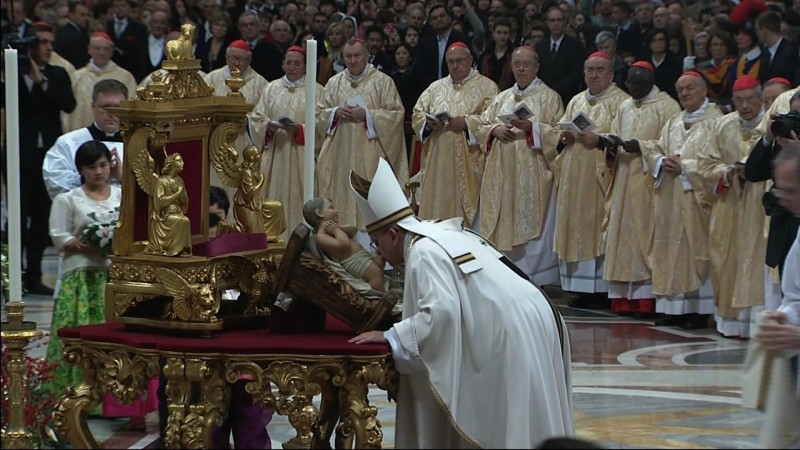After an eventful 12-plus months that began with him being named Time’s Person of the Year and ended with his blistering critique of the Vatican bureaucracy, Pope Francis got a chance to celebrate on Wednesday — by presiding over Christmas Eve Mass at St. Peter’s Basilica.
The Mass, typically one of the biggest events on the Roman Catholic calendar, was attended by 8,000 people inside the Basilica while another 3,000 followed along on screens set up in St. Peter’s Square. This year, a drone outside and various 3-D cameras inside recorded the Mass.
Pope Francis personally requested a performance of Mozart’s Mass in C minor for the service, according to a Vatican spokesman.
Israeli soprano Chen Reiss sang “Et Incarnatus Est” from the Mozart composition. On the Vatican Radio website, Pope Francis said that “Et Incarnatus Est” is “unbeatable and brings you to God.”
Manfred Honeck, music director of the Pittsburgh Symphony Orchestra, conducted the orchestra of the Accademia di Santa Cecilia in Rome.
It is the second Christmas Mass since Francis, born Jorge Mario Bergoglio, became pontiff.
During his Homily, the Pope said that though time has been marked by hatred, oppression, violence and wars, God was there all along, waiting.
“Through the course of history, the light that shatters the darkness reveals to us that God is father and that his patient fidelity is stronger than darkness and corruption. This is the message of Christmas night,” he said, according to an English translation of his remarks.
Since becoming pope, Francis has stayed busy and remained an extremely popular, respected figure worldwide. In recent months, for instance, he urged religious tolerance during a visit to Turkey and played a key role in a historic breakthrough in U.S.-Cuba relations.
His conversational tone, warm demeanor and rapport with children and others have continued to win Francis admirers.
But he has also garnered critics, including among Catholic conservatives, for his positions — such as a push to make the church more welcoming for gays and lesbians and his proposed solution for divorced and remarried Catholics who want to receive Communion.
Despite his high position, Francis hasn’t always been successful: Bishops ended a tense, two-week summit in Rome in October without agreeing, for instance, on how to minister to gays and lesbians.
Such pushback hasn’t stopped the Pope’s efforts to change the church, however.
In his annual Christmas address Monday to the Vatican bureaucracy, the Curia, he criticized its members’ “illnesses” ranging from the “disease of feeling immortal” to vainglory and excessive planning.
“Dear brothers, such diseases and such temptations are naturally a danger for each Christian and for each Curia,” the Pope said. “… We have to cure ourselves of these.”
